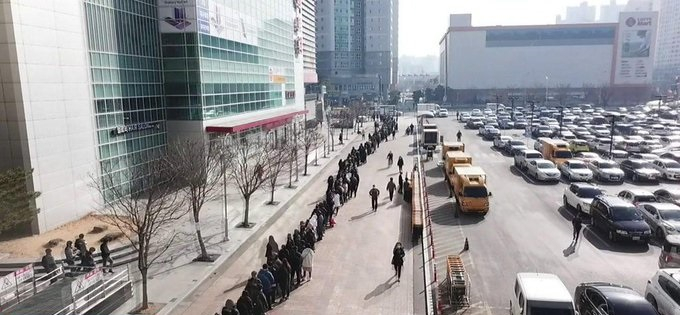South Korea confirmed a three-digit rise in the number of novel coronavirus or COVID-19 cases for the fifth day on Tuesday as the authorities struggled to trace hundreds of members of a church gathering and the military locked down the bases to prevent the spread of the virus.
The Korea Centers for Disease Control and Prevention (KCDC) confirmed 246 new cases of the virus as of midnight on Monday, two days after the reimposition of the strict social distancing rules in the Seoul metropolitan area.
South Korea has been one of the world's coronavirus mitigation success stories but it has suffered repeated spikes in infections and its total number of cases is 15,761, with 306 deaths.
At least 457 infections had been linked to the Sarang Jeil Church, 10 of whom were confirmed to have attended anti-government demonstrations over the past two weekends in Seoul, Vice Health Minister Kim Gang-lip told a briefing. The authorities were trying to trace hundreds more members of the congregation to tell them to self-quarantine and get tested as they posed the highest transmission risk, said Kim.
COVID-19 in South Korea

Authorities have warned of a looming crisis if new outbreaks cannot be controlled, with the health system in danger of being swamped and the risk of serious economic damage. "If the spread ... is not contained this week, it can not only halt the daily routine of the metropolitan area, with a 25 million population but also put the safety of the elderly and the weak at risk," KCDC deputy director Kwon Jun-wook told a briefing.
Another cluster has been traced to a Starbucks Corp outlet outside Seoul with seven new cases taking the tally there to 49. Two new cases were reported in the military, bringing the total number of infections on bases to 88, the defense ministry said. Some 461 military personnel were in quarantine, and all troops have been confined to base, with leave canceled and visits halted for the rest of August.
Prime Minister Chung Sye-kyun convened an emergency meeting to discuss extending curbs nationwide. The Seoul metropolitan area is under phase 2 restrictions, limiting indoor gatherings to fewer than 50 people and outdoor gatherings to no more than 100, and with spectators banned from sports.
Health authorities had categorized social distancing rules in three stages - stage 1 being the least intense and stage 3 the toughest, where schools are shut, businesses are advised to work from home and gatherings limited to 10 people. Kwon said the effort was at a "grave crossroads". "If not controlled and restrained at this level, we can't avoid an upgraded phase 3 social distancing," he said.
(With agency inputs)









